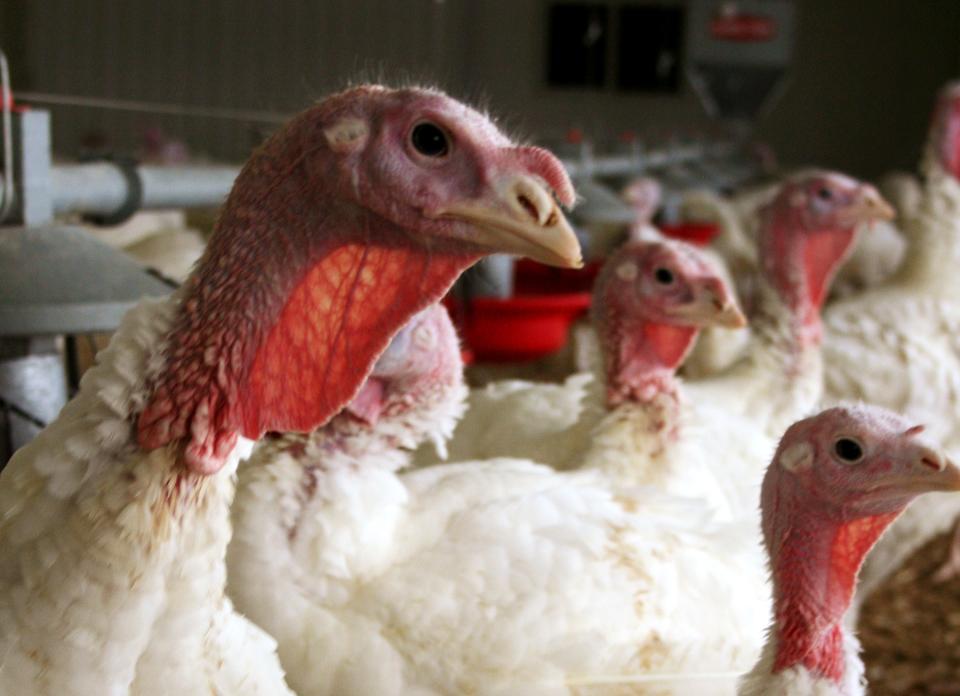Second Iowa bird flu outbreak detected, this time in Buena Vista County commercial turkey facility
Bird flu is spreading in Iowa, with the state reporting its second outbreak Monday, this time infecting 50,000 turkeys in a northwest Iowa commercial facility.
The Iowa Department of Agriculture said the 15-week-old turkeys were destroyed at a Buena Vista County facility to prevent the spread of the highly contagious virus.
Officials are "restricting movement in, within and out" of a quarantine area in a 6-mile circle around the infected facility, said Iowa State Veterinarian Jeff Kaisand. Birds in five commercial facilities and 37 backyard flocks in the quarantined area are being tested.
Tests verified the virus in the Buena Vista County flock late Sunday, Kaisand said. The destroyed birds will be disposed of on location, he said. The owner has the option of composting the birds or burying them.

On Monday, Gov. Kim Reynolds issued a disaster declaration for the county, allowing the state agriculture department and other agencies to assist with detection, tracking and monitoring of the disease and containment, disposal and disinfection.
Iowa Agriculture Secretary Mike Naig said Monday the outbreak at a commercial facility could have trade implications. The U.S. Department of Agriculture will report the case to global animal health and trade officials and wait to see if any restrictions are placed on Iowa birds.
Last week, the Iowa and U.S. agriculture departments said a backyard flock of 42 chickens and ducks where bird flu was detected in Pottawattamie County had been destroyed and incinerated.
Kaisand said he believes wild birds infected the turkey facility as they migrate across the U.S. He sees no connection between the Pottawattamie County and Buena Vista County outbreaks.
Agriculture officials also set up a quarantine area in Pottawattamie County, but with just three backyard flocks in that zone, officials only required that the birds be monitored for signs of infection.
Over the weekend, avian influenza also was discovered in commercial flocks in Maryland, South Dakota and Missouri, bringing to 12 the states with reported outbreaks detected.
Kaisand said poultry producers should put up "as many firewalls as possible between your poultry and wild birds, adding that "separating any connections "between wild birds and domestic birds is absolutely critical this year."
State and federal agencies said none of the birds nor any poultry products from flocks where avian influenza is detected will reach U.S. food supplies. No human cases of highly pathogenic avian influenza have been detected in the United States.
MORE: What you need to know about bird flu
The virus' spread is particularly concerning in Iowa, which leads the nation in egg production, with 55 million laying hens, and ranks seventh nationally for turkey production, raising 12 million birds annually.
Kaisand said it's important to note that there is no cure or vaccine for bird flu.
The virus can wipe out a flock within 48 hours. A 2015 outbreak led to the destruction of 32.7 million laying hens, turkeys and other birds in Iowa. That was about two-thirds of the 50.5 million that were destroyed nationally in what is considered the worst foreign animal disease outbreak on record.
The U.S. Department of Agriculture helps the state and producers get rid of potentially infected birds and disinfect facilities, Naig said. The federal government also will help producers financially with the loss of the birds. "This is a devastating blow to them economically," he said.
He said he believes industry and state and federal government officials are better prepared than in 2015, with tighter biosecurity measures limiting access to facilities and preventing contamination of birds' water and feed.
"None of us want to be facing a foreign animal disease again here in Iowa, but we have learned a lot," Naid said, adding that "we're ready to respond quickly" when an outbreak is identified to prevent the virus' spread.
More: Bird flu, a major threat to poultry industry, found in Iowa backyard flock, USDA says
Last week, Naig said Iowans with flocks should be "on high alert" over the next couple months while wild birds are migrating. The state is part of the Mississippi flyway, a migration route for millions of birds annually.
Naig said the discovery of disease in Iowa on March 1 was "not unexpected," given reports it had been detected in wild, backyard and commercial flocks, mostly in eastern U.S. states.
Kaisand urged poultry owners to immediately report to the state and federal agriculture departments any birds that become sick or die unexpectedly.
Officials say poultry products remain safe to eat when properly handled and cooked.
U.S Department of Agriculture figures for 2020, the latest available, show Iowa's poultry industry receipts were $1.28 billion.
Donnelle Eller covers agriculture, the environment and energy for the Register. Reach her at deller@registermedia.com or 515-284-8457.
This article originally appeared on Des Moines Register: 50,000 turkeys in a commercial facility destroyed after bird flu is detected

